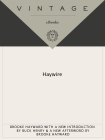Haywire by Brooke Hayward (book club books .txt) 📗

- Author: Brooke Hayward
Book online «Haywire by Brooke Hayward (book club books .txt) 📗». Author Brooke Hayward
In the fall of that year, three momentous events took place almost simultaneously: Father left us to go East for rehearsals of A Bell for Adano, Grandfather died of cancer, and Mother, unilaterally deciding the time had come to leave California, bought a farm in Connecticut.
She wrote us, “Darlings, I’m so excited about your teeth coming in, Brooke, and about yours going out, Bridget! Do you think I’ll be able to recognize you when I come home in two months now? Bill, don’t knock any of yours out.
“Grandfather’s funeral was very beautiful. It looked like this.” (She drew a diagram of his coffin, draped with the American flag, with two big crosses of lilies at its head and a wreath from his soldiers at its foot.) “A large choir sang hymns, and then everyone joined in ‘My Country, ’Tis of Thee.’ Then before the pallbearers took the casket out, about fifty of his old colored soldiers marched out ahead, some of them crying because they’d lost such a good friend. Father and I didn’t cry because we were so happy that the Colonel was peaceful and quiet now after so many long months of suffering and misery. In the last World War—27 years ago—he organized all the colored troops and took them to France to fight. They were very brave and adored your grandfather. And he would have been very touched to see how many came to say goodbye to him. He was a fine honest brave man and you can be very proud of him. He was of you.
“As far back as last Christmas we knew he had a terrible disease and would have to die. So you see even Maisie is not too unhappy about it. She has known for a long time that the sooner it happened the better it would be for the Colonel. Maisie has a magnificent marble mausoleum in the country. Her son, Philip, is in it—and now the Colonel will be there too.” (According to Father, Maisie wheedled him into arranging all the details of the funeral—which he envisioned, according to his view of the Colonel’s character, as having a military austerity and dignity—then ordered, on her own initiative, a six-thousand-dollar bronze casket, “the most expensive casket in New York,” while he argued that all the Colonel would have wanted was a simple pine coffin. But what Father resented was that afterward, she, one of the richest women in New York City, had the bill sent to him.)
On weekends, Mother and Father sometimes stayed with Paul Osborn (the playwright who had adapted A Bell for Adano for the stage) and his wife, Millicent, at their house in Connecticut about two hours outside of New York City. One Sunday, they all piled into the car for a drive through the New England countryside. It was late September, just before the rolling hills ripened into mounds of gold. On a narrow road two miles outside the little town of Brookfield, Mother exclaimed, “Stop the car!” She pointed through the maple trees at an old farmhouse. “That’s exactly the house I’ve always wanted. Let’s go ask if it’s for sale.”
With typical impatience, she ignored the loud outcry of objections from the others—it was Sunday; there was no “For Sale” sign; she couldn’t just pick a house at random, for God’s sake; it would be rude, not to mention embarrassing, to barge in on the owner—and blithely strode across the grass to ring the front doorbell. A few minutes later, she returned triumphant. Not only was the owner, Mrs. Elroy Curtis, charmed by her unexpected guest but amazed at her well-timed arrival; by coincidence the house was going on the market in a week.
“Darlings!” Mother wrote us. “What do you think of this place Father and I found in the country, not far from the Osborns’? Instead of one red barn it has three! And it has a brook, and it’s not far from a river where we can fish, and apple trees, and a small swimming pool and chicken houses, and a couple of cows and a few sheep, and woods and a wonderful great attic where you can play, and a nice school not too far away.…”
Shortly after that, A Bell for Adano went into rehearsal. Mother was beginning to count performances until her run with “The Turtle” ended. “Darlings—Leland still hasn’t arrived—it’s Sunday afternoon and he was due to fly in this morning—but you know he’s like a mosquito the way he hops around. I can never get my finger on him before he’s somewhere else again. I’m very lonesome all by myself here—Forty-eight more performances—six more weeks!!! Bless your hearts—I love you, each one of you so much—and miss you much more than you can ever know—and you can’t know until you grow up and have to be separated from your children—Mother.”
During out-of-town tryouts of “Adano” Father, who disliked writing real letters himself and customarily dictated all his correspondence to a secretary, sent us a rare example of his penmanship. “Darling children—Mother and I are in the country today at the new





Comments (0)